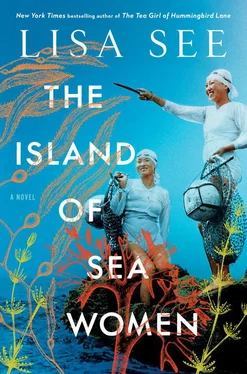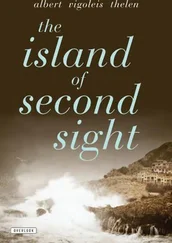I picked my way through the crowd to the little house that Do-saeng and I—two widows—now shared. I put away my tubs and added the cash I’d earned today to the tin box where I kept my savings. When I was done, Do-saeng said reproachfully, “They’ve been peeing in the courtyard again.”
“Tell them to use the latrine next time.”
“Do you think I didn’t?”
Not only were we the first in Hado to get a television, but our compound had been among the first to be affected by Saemaul Undong—the New Village Movement—which the regime had recently inaugurated. We’d been told we couldn’t promote tourism without upgrading the island. We were to have indoor plumbing, electricity, telephones, paved roads, and commercial airlines. This meant, among other things, that thatch roofs had to be replaced with those made of corrugated tin or tile. We were told tourists wouldn’t like our three-step farming system, and that we had to get rid of our pigsty latrines. Tourists wouldn’t want to see or smell pigs, and they certainly wouldn’t want to put their rear ends above the pigs’ greedy snouts. I didn’t know one family willing to tear down its latrine, and I’d continue to keep mine for as long as possible. So much change so fast was unsettling, and it undermined our way of life, our beliefs, and our traditions.
“You spoiled your children, and now you’re spoiling your grandchildren with that television,” Do-saeng complained.
I absorbed the criticism. Yes, I gave a spoonful of sugar to Min-lee’s twins and to her two daughters whenever I saw them, which was every day. I didn’t begrudge my grandchildren their treats, but the television had clearly been a mistake.
“Look at it this way,” I said. “You get to see your great-grandchildren every day, and you’re healthy enough to enjoy them. Not every woman your age can say that.”
At seventy-three, Do-saeng was in remarkable shape. Her braids had gone gray, but her body was strong. Even though she was well past retirement age, she’d begun diving again. That broke the rule of having more than one diver per household, but the man in charge of the Village Fishery Association let her join us from time to time because we needed her, and women like her, since it was impossible to find baby-divers these days. This, more than giving sugar to children, would have been unimaginable back when my own grandmother was alive.
“Tomorrow is going to be a big day,” she reminded me. “You need to tell everyone to go home.”
“You’re right,” I agreed. “But I think I’ll join them for a while first.”
“Hyng!”
I took some tangerines from a bowl and tucked them in my pockets. Then I waded through the courtyard and into the big house.
“Granny!”
“Granny!”
I sat with my legs tucked under me, my bottom nestled between my feet. My granddaughters climbed into my lap, and my grandsons cuddled close.
“Did you bring us anything?” the oldest girl asked.
I pulled out a tangerine. I unpeeled it in one long string. Once I was done, I rolled the peel back into its tangerine shape and set it on the floor. The children loved when I did that for them. I gave them each a couple of wedges, then repeated the process three times.
How lucky I was to have such beautiful grandchildren. How fortunate I was that Min-lee had married a teacher like her father, who taught right here in Hado. I missed Kyung-soo and his family, though. When he’d sent word that he was getting married, I’d thought the wedding would happen here. But when the goddess brought him home, he was already married to his mainland wife. I’d participated in no discussions about matching birth dates or seeking help from the geomancer for a propitious day to hold the wedding. Naturally, my feelings were injured, but I let all that go when I met my daughter-in-law for the first time and saw she was big with a baby in her belly. After they returned to Seoul, she gave birth to a son, giving me another grandson. Now she was pregnant with a second child, and Kyung-soo worked at his father-in-law’s electronics company. I wished my only son didn’t live so far away, but there was nothing I could do about it.
I missed Joon-lee most of all. For the last four years, she’d also been in Seoul. In the fall, she’d attend the Graduate School of Public Health at Seoul National University. Tomorrow she’d be coming home for a short visit. The note she’d written to Min-lee had said, “I have a surprise for everyone.” My guess was she’d won another award.
“Do you have more tangerines?” the five-year-old asked. I turned out my pockets to show they were empty. She sucked her bottom lip in disappointment. I kissed her forehead.
Do-saeng was right. I did spoil these little ones. I gave them and their parents everything—fixing up our houses to meet the new standards, buying tricycles and bicycles, getting the television so they could learn more about our country and the world—and it had left them soft. Children these days wanted easy lives. They didn’t have the physical or emotional strength of their grandmother or great-grandmother. That said, I loved them and would sacrifice anything for them, even if it meant selling seafood to American soldiers on a street corner.
I’d been a widow for twenty-three years, but I considered myself to be a fortunate woman. I squeezed the twins, they squealed, but no one seemed to mind the noise. Everyone was too focused on the shoot-out happening on the screen.
_____
The next day, our diving was good. I was the last to leave the bulteok and was just crossing the beach toward my house when a motorcycle came bumping along the shore road and pulled to a stop. A man wearing a black leather jacket and a helmet that hid his face sat in front. Joon-lee sat behind him, holding his waist. She waved and called, “Mother! It’s me! I’m home!” She jumped off the bike and ran down the steps and across the beach to me. Her long black hair flew behind her. Her short shirt fluttered in the wind. When she reached me, she bowed.
“I thought you weren’t coming until later,” I said. “The bus—”
“We rented the bike.” With that, her initial burst of enthusiasm ebbed, and she stood with such stillness that I was immediately concerned.
“We?”
She took my hand. “Come, Mother. I couldn’t wait to tell you. I’m just so happy.” Her hand was soft and warm in mine, but her voice was far too somber to be expressing anything close to joy.
I kept my eyes on the man with the motorcycle. He didn’t have to take off the helmet for me to know who he was, because he was in nearly the same spot where he’d been perched on his new bicycle many years ago to see what was happening on the beach with Dr. Park and his team. When I said his name in my mind—Yo-chan—my stomach fell so hard and fast that for a second the world went black. I blinked a few times, trying to bring back light. Up on the roadway, Yo-chan set the kickstand, took off his helmet and hung it on one of the handlebars, and watched us approach. He put his palms on his thighs and bowed deeply when we reached him. As he rose, he offered no greetings or small talk. Instead, he said, “We’ve come to tell you that we’re going to get married.”
The inevitability of this moment seemed obvious and predictable, and yet it was still agonizing. I hesitated awhile, too long, really, before I asked, “What does your mother say?”
“You can ask her yourself,” he answered. “She’s coming in a taxi.”
I felt as though I were suspended in gelatin, watching as he turned to the bike and pushed it the last few meters to my house, with Joon-lee following behind him.
_____
We aligned in two pairs: my daughter next to me facing Yo-chan, who sat next to his mother, who faced me. Teacups sat on a small tray on the floor between us. I could hear my granddaughters crying across the courtyard in the little house, where Min-lee had taken them so I could have this meeting in the big house. I hadn’t seen Mi-ja in eleven years. When she’d entered, I saw that her limp was much worse, and she used a cane. She looked far older than I did, even though her life had to be easier than mine. Her clothes were loose. Her hair had gone completely gray. Looking into her eyes, I sensed a deep well of unhappiness. That was not my problem, however.
Читать дальше












